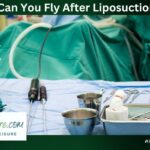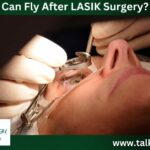Sinus surgery is a medical procedure to treat chronic sinusitis or other sinus-related conditions.
It aims to improve sinus drainage and reduce the frequency and severity of sinus symptoms.
Having sinus surgery can significantly improve a person’s quality of life by reducing pain, congestion, and recurrent infections.
However, many patients wonder if they can fly after sinus surgery.
Due to variations in air pressure and altitude, flying could potentially result in difficulties or discomfort after sinus surgery.
The ability to fly after sinus surgery depends on various factors, including the type of surgery, the patient’s recovery progress, and overall health.
It’s essential to consult with your surgeon before making any travel plans to ensure it is safe to fly.
What Are The Types Of Sinus Surgery?

A patient may undergo several types of sinus surgery, depending on their specific condition and symptoms.
These include:
Functional Endoscopic Sinus Surgery (FESS)
FESS is the most common type of sinus surgery.
It is a minimally invasive procedure that uses an endoscope, a thin and flexible tube with a camera, to visualize and remove any blockages in the sinuses.
FESS can help improve sinus drainage and relieve symptoms such as nasal congestion, facial pain, and recurring sinus infections.
Balloon Sinuplasty
Balloon sinuplasty is a less invasive alternative to traditional sinus surgery.
During this procedure, a small balloon catheter is inserted into the sinus opening and inflated to widen the blocked sinus passages.
This allows for better drainage and relief of sinus symptoms.
Image-Guided Surgery
Image-guided surgery utilizes advanced imaging technology, such as CT scans, to provide real-time visual guidance during sinus surgery.
This helps the surgeon more precisely navigate the intricate sinus anatomy, ensuring accurate and targeted treatment.
The type of sinus surgery a patient undergoes may impact their recovery and the timeframe for when they can resume specific activities, such as flying.
Following your surgeon’s post-operative instructions and seeking their advice before making any travel plans is crucial.
In the next section, we will discuss the factors to consider when determining if flying is safe after sinus surgery.
Can You Fly After Sinus Surgery?
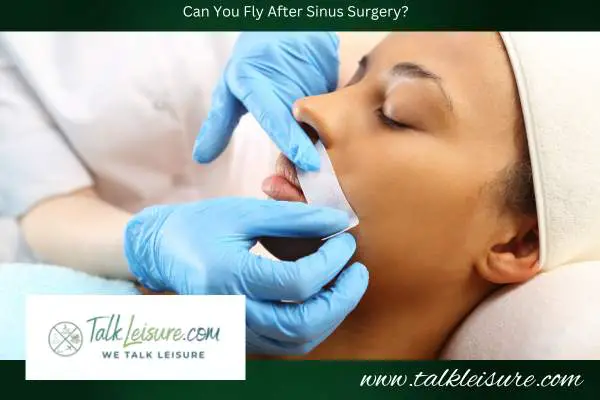
After undergoing sinus surgery, it is common to have concerns about when it is safe to resume air travel.
Flying after sinus surgery can potentially cause complications or discomfort due to changes in air pressure and altitude.
However, the timing for flying post-surgery can vary depending on the individual and the type of surgery performed.
It is important to consult with your surgeon to get personalized advice regarding air travel after sinus surgery.
How Soon After A Sinus Surgery Can You Fly?

The general recommendation is to wait at least one to two weeks before flying after sinus surgery.
During this period, giving your body enough time to heal and recover from the surgical procedure is crucial.
The exact flying time after sinus surgery may vary depending on factors such as the extent of the surgery, the healing process, and the individual’s overall health.
It is important to note that every individual heals at a different rate, and your surgeon will provide you with specific guidelines based on your unique situation.
They may consider factors such as the type of surgery performed, any potential complications, and your overall progress during the healing process.
Flying too soon after sinus surgery can increase the risk of complications such as bleeding, pain, and pressure changes.
Giving your body enough time to recover before flying is crucial for ensuring a safe and comfortable journey.
During the consultation, your surgeon may also discuss the importance of using nasal saline sprays or nasal drops before and during the flight.
Nasal saline spray will be helpful even when you are flying with a perforated sinus.
These can help keep the nasal passages moisturized and reduce the discomfort caused by dry air during the flight.
What Factors May Affect The Timeframe For Flying After Sinus Surgery?
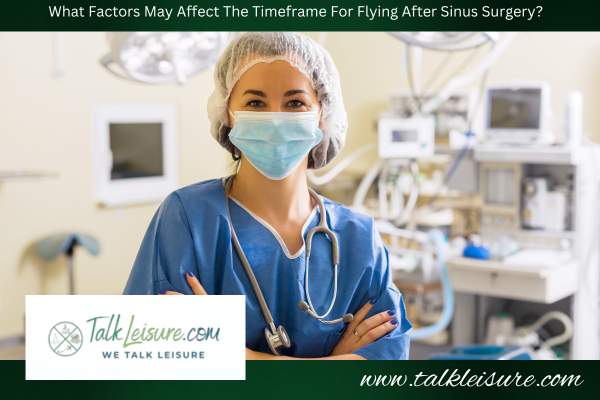
Healing Progress
The healing process is unique to each individual and depends on the extent of the sinus surgery performed.
It is important to follow your doctor’s instructions and wait until you fully recover before traveling by air.
Surgical Technique
Different surgical techniques may have varying recovery times.
Some procedures may require more time for healing than others, depending on the complexity of the surgery.
Your Doctor’s Recommendation
Your doctor knows your specific case and will provide you with the best advice regarding when it is safe for you to fly after sinus surgery.
It is essential to follow their guidance to avoid complications.
What Are The Potential Risks And Complications Associated With Flying Too Soon After Sinus Surgery?
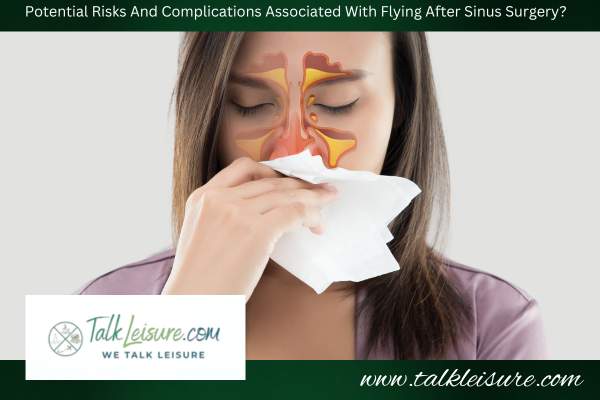
Flying too soon after sinus surgery can pose certain risks and complications, such as:
1. Increased Sinus Pressure
Flying at high altitudes can cause changes in air pressure, which can put pressure on the sinuses.
This increased pressure may lead to discomfort, pain, and potential complications.
2. Delayed Healing
The changes in pressure during air travel could impede the healing process of the surgical site.
Giving your body enough time to heal before subjecting it to the potential stressors of air travel is crucial.
3. Increased Risk Of Infection
The cabin environment of an airplane is a breeding ground for germs.
It is important to avoid exposing open wounds or incision sites to potential infections, as this could lead to complications.
4. Nasal Bleeding
The changes in cabin pressure during air travel can potentially cause nasal bleeding, especially if the surgical site is still healing.
Nasal bleeding can be uncomfortable and may require medical attention.
Always consult your doctor before deciding about air travel after sinus surgery.
They will assess your case and provide personalized advice based on your recovery progress and surgical technique.
It is important to prioritize your health and safety above all else.
What Is The Importance Of Consulting With Your Surgeon?

Before making any decisions regarding air travel after sinus surgery, it is essential to consult with your surgeon.
They will be able to provide you with personalized advice based on your specific condition and the type of surgery you underwent.
Your surgeon will assess your healing progress and determine if it is safe for you to fly.
They will consider factors such as the extent of the surgery, any complications, and how well your sinuses are healing.
The time since your sinus surgery will also impact whether it is safe to fly.
In the early stages of recovery, it is generally advised to avoid air travel to allow for sufficient healing.
One of the main concerns with flying after sinus surgery is the potential for pressure changes in the sinuses and ears.
Your surgeon will assess if your sinuses are clear and your eustachian tubes can adequately equalize pressure during the flight.
Your surgeon may prescribe medications to manage symptoms and aid healing.
It is important to discuss how to manage your medications during air travel and if any adjustments need to be made.
It is crucial to have open and honest communication with your surgeon throughout the recovery process.
They are best equipped to provide individualized advice based on your specific situation.
Following their guidance can ensure a safe and smooth recovery after sinus surgery.
Final Thoughts
After sinus surgery, taking proper care and precautions is important to ensure a smooth healing process.
While avoiding flying immediately after sinus surgery is generally recommended, every individual’s situation may vary.
Therefore, it is essential to consult your healthcare provider for personalized advice.
It takes time for the sinuses to heal after surgery, and the exact healing time may vary depending on the individual and the extent of the surgery.
It is advisable to wait at least a week or as your doctor recommends before considering air travel.
One of the main concerns with flying after sinus surgery is the changes in air pressure during the flight.
These pressure changes can affect the sinuses and potentially cause discomfort or complications.
Giving your sinuses enough time to heal and adjust before subjecting them to pressure changes is important.
It is common to experience some post-operative symptoms such as nasal congestion, swelling, and drainage.
These symptoms can affect your comfort and ability to equalize pressure during the flight.
It is best to wait until these symptoms subside before considering flying.
Airplanes can be a breeding ground for bacteria and viruses, posing a risk of infection, especially during the early stages of healing after sinus surgery.
It is important to minimize the risk of infection by avoiding crowded spaces, practicing good hygiene, and following your doctor’s instructions regarding post-operative care.
Your healthcare provider is the best person to advise you on when it is safe to fly after sinus surgery.
They are familiar with your medical history, the specifics of your surgery, and any potential complications that may arise.
It is crucial to have open and honest communication with your doctor and follow their guidance.
Remember, everyone’s recovery time and healing process may vary, and it is essential to prioritize your health and well-being.
If you have any concerns or questions about flying after sinus surgery, consult your healthcare provider for personalized advice and recommendations.
Best Wishes!


